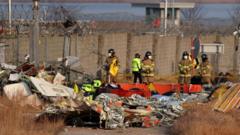Empty line 4
Article text: More than 170 people lost their lives in the devastating crash of a Jeju Air Boeing 737-800 at Muan International Airport on Sunday morning. The flight, 7C2216, was returning from Bangkok, Thailand, when it tragically went off the runway, collided with a barrier, and ignited a fierce blaze. Of the 181 individuals on board, 179 were confirmed dead, with only two crew members surviving after being rescued from the wreckage.
Preliminary investigations suggest that a bird strike, compounded by adverse weather conditions, may have played a role in the accident. Air traffic control had issued warnings about bird activity shortly before the incident, with the pilot reporting a bird strike just moments before attempting to abort the landing. Despite these alarming signals, the plane touched down at approximately 09:02, skidding down the runway and crashing into a wall.
Eyewitnesses recounted hearing loud explosions following the crash, and video footage captured the harrowing sight of flames rising from the wreckage, which took fire crews a significant amount of time to extinguish. The chief of the Muan fire department confirmed ongoing investigations into the root cause, including the analysis of the flight data recorders that could take weeks to decode.
As news of the tragedy spread, families rushed to Muan Airport, holding onto hope and grappling with the bitter reality of loss. Authorities have confirmed that 141 bodies have been identified, among them five children. The investigation is also opened into the airline’s safety protocols, given that Jeju Air has maintained a solid safety record since its inception in 2005.
In the wake of this disaster, acting President Choi Sang-mok has called for immediate safety inspections across South Korea’s airline operations. The government has declared Muan a special disaster zone, enabling faster aid to victims and their families. The tragedy has cast a long shadow over New Year festivities, as national mourning is observed.
As the investigation unfolds, experts remain cautious about attributing the crash solely to the bird strike, emphasizing that aviation safety protocols typically mitigate such incidents. The event raises pressing questions about aircraft vulnerabilities and the need for heightened safety measures in the bustling world of air travel.
Article text: More than 170 people lost their lives in the devastating crash of a Jeju Air Boeing 737-800 at Muan International Airport on Sunday morning. The flight, 7C2216, was returning from Bangkok, Thailand, when it tragically went off the runway, collided with a barrier, and ignited a fierce blaze. Of the 181 individuals on board, 179 were confirmed dead, with only two crew members surviving after being rescued from the wreckage.
Preliminary investigations suggest that a bird strike, compounded by adverse weather conditions, may have played a role in the accident. Air traffic control had issued warnings about bird activity shortly before the incident, with the pilot reporting a bird strike just moments before attempting to abort the landing. Despite these alarming signals, the plane touched down at approximately 09:02, skidding down the runway and crashing into a wall.
Eyewitnesses recounted hearing loud explosions following the crash, and video footage captured the harrowing sight of flames rising from the wreckage, which took fire crews a significant amount of time to extinguish. The chief of the Muan fire department confirmed ongoing investigations into the root cause, including the analysis of the flight data recorders that could take weeks to decode.
As news of the tragedy spread, families rushed to Muan Airport, holding onto hope and grappling with the bitter reality of loss. Authorities have confirmed that 141 bodies have been identified, among them five children. The investigation is also opened into the airline’s safety protocols, given that Jeju Air has maintained a solid safety record since its inception in 2005.
In the wake of this disaster, acting President Choi Sang-mok has called for immediate safety inspections across South Korea’s airline operations. The government has declared Muan a special disaster zone, enabling faster aid to victims and their families. The tragedy has cast a long shadow over New Year festivities, as national mourning is observed.
As the investigation unfolds, experts remain cautious about attributing the crash solely to the bird strike, emphasizing that aviation safety protocols typically mitigate such incidents. The event raises pressing questions about aircraft vulnerabilities and the need for heightened safety measures in the bustling world of air travel.


















